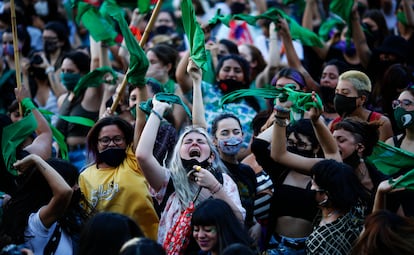What if Diego Maradona were a woman?
The soccer star’s daughter protested for abortion to be legalized in 2018. It didn’t happen then, but it will happen soon

If Diego Maradona were a woman, he wouldn’t be famous, and soccer wouldn’t have made him wealthy. Hordes of people wouldn’t have risked lining the streets of Buenos Aires in the midst of a pandemic to pay their respects. No insult to the deceased is intended here. Both of us, one Brazilian and one Argentinian, are saddened by Maradona’s untimely death. Both of us recall Sundays as little girls in Alagoas and Córdoba, listening to the sound of sports broadcasters calling the game on radio or television and hearing men’s ecstatic shouts at every goal. Maradona’s story is also the story of masculine ambiguity in our countries – a fellow adored and adorable to fans, an abuser behind walls. He was publicly accused of violence against his wives and girlfriends, making him a typical macho by regional standards – after all, Latin America and the Caribbean report the world’s highest rates of violence against women and girls.
For our generation, the idea of a female soccer player was unthinkable. Today Marta Vieira da Silva, Brazil’s master dribbler, is one of the world’s greats. She is neither as famous nor as wealthy as Pelé or Maradona and no controversy surrounds her private life, though the matter of her sexual orientation has stirred prurient curiosity. Marta has little to say about politics or even about herself. She was raised by a single mother in poor rural Brazil. People in her town of 10,000 labeled her a tomboy because she played soccer, a man’s sport. Marta never knew her father, who abandoned the family when she was one. Some refer to this male action as a “paternal abortion.”
In the coming days, it will not be men singing soccer hymns in remembrance of Maradona who will take to the streets of Buenos Aires; it will be ordinary women and girls
Paternal abortion does not exist. What exists is the abandonment, negligence and loneliness faced by women while caring for children. Abortion is something experienced by bodies that gestate, by women. In Marta’s Brazil and Maradona’s Argentina, abortion is criminalized. Women there take their chances with backstreet abortions; many fall ill, others die, because at some point in their lives, these women know they cannot have a child. In Marta’s Brazil, abortion has become a political issue, fueling right-wing hatred and the persecution of women’s sexuality and reproduction. Stuck inside their homes during the coronavirus pandemic, little girls become the victims of rape and are then harassed and called “killers” when they seek legal abortion services. Similar horror stories are told in Argentina, where little girls are raped and then tricked by doctors to keep them from obtaining abortions, harassed by Evangelicals who throw them baby showers or left forgotten in shelters.
But something different is about to happen in Argentina, a country still mourning Maradona. Abortion has become an issue for ordinary people, for the crowds who formed the green wave in 2018. In the coming days, it will not be men singing soccer hymns in remembrance of Maradona who will take to the streets of Buenos Aires; it will be ordinary women and girls, people of all ages and types, families with grandmothers and babies in arms. The president of Argentina, Alberto Fernández, has presented two bills before Congress, one that legalizes abortion up to the 14th week of pregnancy and one that protects the first thousand days of a newborn’s life. Anything but contradictory, these two proposals defend women’s lives across the board by defending their decision about whether, how and when to have children.
Maradona was an advocate of Fernández’s bill: “My idea is to take care of women,” he said. We don’t know if his daughters tamed his manliness or if Maradona’s position on abortion was simply more advanced than that of many male holders of public power. One of his daughters, Dalma Maradona, took part in the 2018 protests. Like her, we also marched and kept vigil through the night, accompanying the long-drawn-out, memorable voting in the Senate. Nothing came of it then, but it seems it won’t be long before Argentina becomes the largest country in Latin America and the Caribbean to legalize abortion, through a bill presented by the nation’s president. “I think if it isn’t today, it will be tomorrow ... Women are mobilizing. Women are demanding it,” Dalma said. Indeed. Maradona won’t be here to commemorate with us, but all signs point that – to borrow an expression from the movement in Argentina – será ley. It will become law.
Debora Diniz is a Brazilian anthropologist and researcher at Brown University.
Giselle Carino is an Argentinian political scientist and IPPF/WHR director.
Tu suscripción se está usando en otro dispositivo
¿Quieres añadir otro usuario a tu suscripción?
Si continúas leyendo en este dispositivo, no se podrá leer en el otro.
FlechaTu suscripción se está usando en otro dispositivo y solo puedes acceder a EL PAÍS desde un dispositivo a la vez.
Si quieres compartir tu cuenta, cambia tu suscripción a la modalidad Premium, así podrás añadir otro usuario. Cada uno accederá con su propia cuenta de email, lo que os permitirá personalizar vuestra experiencia en EL PAÍS.
¿Tienes una suscripción de empresa? Accede aquí para contratar más cuentas.
En el caso de no saber quién está usando tu cuenta, te recomendamos cambiar tu contraseña aquí.
Si decides continuar compartiendo tu cuenta, este mensaje se mostrará en tu dispositivo y en el de la otra persona que está usando tu cuenta de forma indefinida, afectando a tu experiencia de lectura. Puedes consultar aquí los términos y condiciones de la suscripción digital.








































